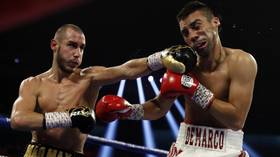Maxim Dadashev tragically died chasing a dream, but it would be more tragic to take that dream away

Whenever there is a death in sport the immediate reaction is an understandable one. How could it have been prevented? Who was to blame? Is there something that needs to be improved to stop something similar happening again?
These are all totally reasonable, rational thoughts to have after such a heartbreaking incident.
But some – mostly those who abhor the sport of boxing in the first place – will use Dadashev's death to call for boxing to be banned. We've seen similar calls in the past, and we're sure to see them again.
Also on rt.com Russian boxer Dadashev, who suffered 'severe brain damage' after TKO loss, dies of his injuriesBut those misgivings about the sport may say more about the lack of understanding and appreciation for those who take part, and about why they compete in these sports in the first place.
Promoter Lou DiBella hit the nail on the head when he tweeted that you cannot make boxing safe, but you can make it safer.
Rest In Peace, Maxim Dadashev. #Boxing is a very unforgiving sport. We can’t make it safe, but we can make it safer. We can also rally to economically help his wife and son. We must take care of our own. This is heartbreaking news.
— Lou DiBella (@loudibella) July 23, 2019
Indeed, Dadashev's death will hopefully further sharpen the focus of boxing's authorities, together with promoters, to ensure that all feasible precautions are taken before bouts, and that fighters receive the very best possible care after them.
However, the suggestion that the sport of boxing should be banned is one that seems harder to countenance.
The truth is boxing is just one of many sports that incur a level of serious personal risk to the athletes involved, and that those athletes are fully aware of those risks when they compete.
From direct contact sports like boxing, mixed martial arts, American football and rugby, to high-speed sports such as motor racing, motorcycle racing and downhill skiing, to precision, high-risk sports such as rock climbing, the dangers involved are an integral part of the event.
Those risks are why some people enjoy watching those sports and they're also why many people take part. In many cases, the risks themselves are as much of an opponent to the athletes as their sporting rivals are.
Also on rt.com 'It’s a brutal, cruel sport. May God rest his soul': Tributes pour in for tragic boxer DadashevEven when disaster or tragedy strikes, the commitment and passion these athletes have for their sport drives them to find a way to carry on, sometimes in situations where few others would ever consider returning to the sporting arena.
When motor racing ace Alex Zanardi lost both his legs in a sickening crash at the Lausitzring in 2001 he did everything he could to get back to fitness, return to the same track and get back into his old car.
Amazingly, two years later, he did just that and completed the remaining laps of the race at a speed that would have qualified him in the top five that year. Despite nearly losing his life, Zanardi's one desire after his life-changing crash was to get back on track and go flat out once again.
Racers at the Isle of Man TT – a motorcycle race that is notorious for taking the lives of riders on its treacherous roads – see teammates and friends die on the roads, then go out and still manage to race themselves.
Some, like TT racer Conor Cummins, have experienced terrifying accidents and miraculously lived to tell the tale, yet still return to race again. Did the knowledge of tragedy to people close to them stop them from pursuing their goals?
UFC fighter Michael Bisping suffered one of the biggest, scariest knockout losses in UFC history to Dan Henderson at UFC 100, and nearly lost his eyesight in one eye after another devastating defeat to Vitor Belfort.
Yet Bisping refused to give up and eventually went on to become a world champion and a Hall-of-Famer in arguably the toughest combat sport of all, mixed martial arts. Bisping knew the risks to his sight by continuing his career, but did he let it stop him on his quest for a world title?
And rock climber Alex Honnold, who was all too aware of the fact that fellow members of the rock climbing community had fallen to their deaths attempting to "free solo" (climbing without ropes) difficult rock faces, nonetheless attempted to become the first person to climb the mammoth El Capitan in 2017. If El Capitan had a safety net to prevent Honnold from a tragic fall, would he have been so determined to climb it without ropes?
The one thing all those athletes had in common was an acceptance of their own health and mortality, and a refusal to let fear stand between them and their athletic goals. Sadly, some athletes never quite reach those goals. And, tragically, a small number of athletes die trying.
Maxim Dadashev died chasing his sporting dream in one of the toughest sports known to man. Does that mean the sport he loved should no longer exist? Some would doubtless like things better that way.
But much of the appeal of sport comes down to the fact that people love to see other people doing things they themselves cannot do, or wouldn't in a million years ever dream of doing.
As someone who has covered mixed martial arts for more than a decade, I know that contrast very well – I could never do what the people I write about do on a regular basis. Instead, they have my utmost respect, both in victory and defeat.
These athletes respect the risks and choose to face them in their quest for athletic greatness. We should respect them and celebrate them, while governing bodies should provide for them and protect them as much as they possibly can. But we should never take their dreams away. Without them, they have nothing to compete for.
RIP Maxim Dadashev.
By Simon Head













